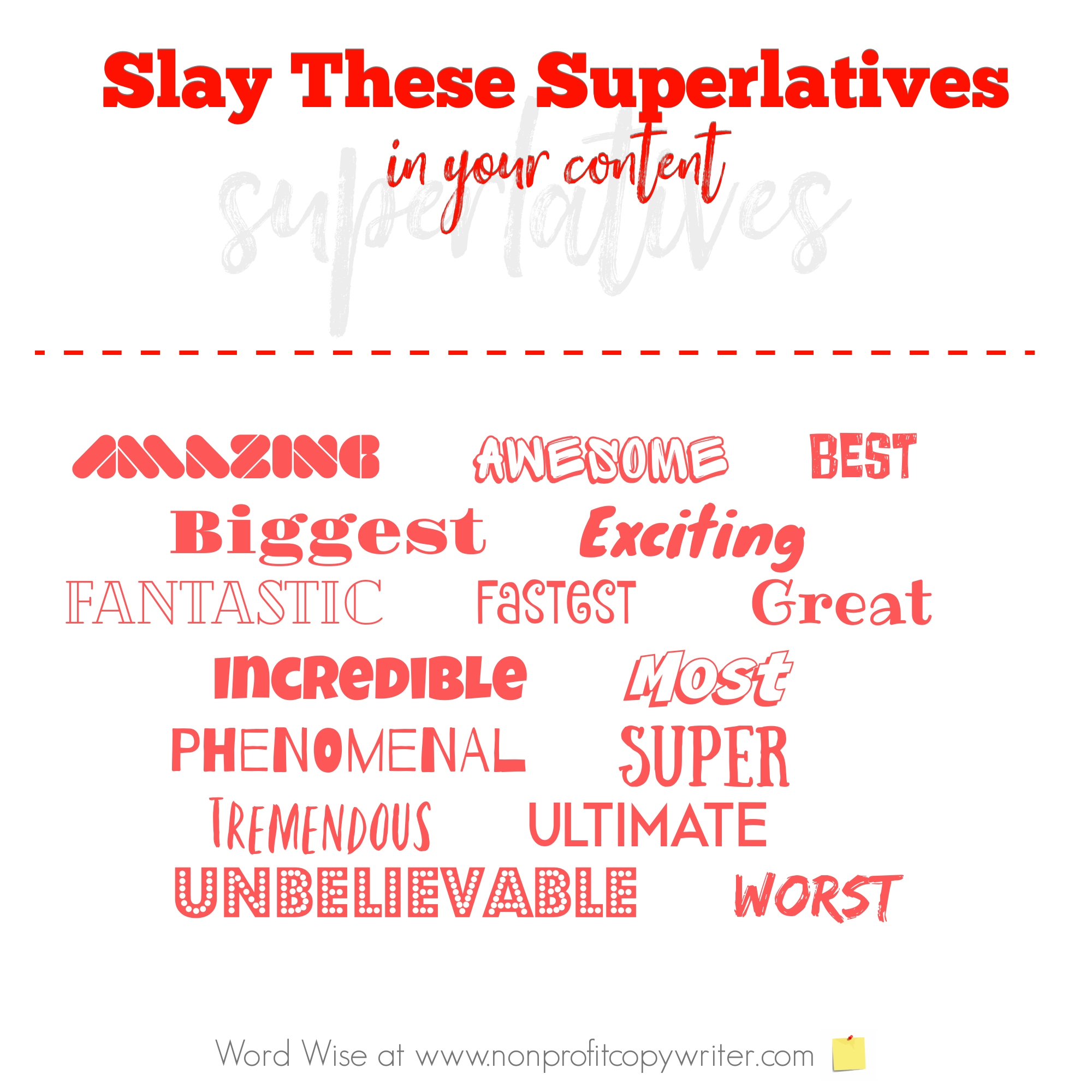Save Time: Get 5 Simple Writing Tips
you can put to use in 10 minutes
Slay Superlatives to Show, Rather Than Tell
Award-winning writer Kathy Widenhouse has helped hundreds of nonprofits and writers produce successful content , with 750K+ views for her writing tutorials. She is the author of 9 books. See more of Kathy’s content here.
Updated 7.12.25
The radio interview caught my attention. “It was phenomenal,” gushed the guest, a public school teacher who struggled to motivate her class during the COVID-19 pandemic. “As soon as I offered incentives, students turned in their work on time. It was awesome!”
The verbal excess gave me pause. Those arm-twisting results are not “phenomenal,” which means “extraordinary” or “astonishing” or “exceptional.” Children enjoy candy and gift cards and free time. What else should a teacher expect from bribes?
As my ears and eyes become more sensitive to overreaching words, I notice certain terms used too often. Once, they had an impact. Now, not so much.
They’re superlatives: exaggerated expressions. A superlative overstates or embellishes. Like hyperbole, a superlative inflates.
Superlatives vs. hyperbole
Yet a hyperbole is a literary device. It adds emphasis but is not literally true — and readers know it. A writer might say, “Bryan was taller than a giraffe,” but the reader understands that Bryan won’t top out the measuring stick at 15 feet. He’s just a whole lot taller than everyone else.
Superlatives, on the other hand, are excessive. When they’re used sparingly, they make a point. If you write, “Gary is the most sought-after real estate agent in Carter County,” and you pull out facts to show that the statement is true, then “most” does its job in singling out Gary.
But overused superlatives? They’re a lazy writer’s way out. Writers use superlatives when they cannot offer facts, proof, an example, or a better word.
Superlatives try to tell you what to think by employing overused words. Yet when something is genuinely good, you can use description to show it. Slaying the superlatives in your writing is one way to address that classic writer’s admonition to “show, rather than tell.”
Alternatives to superlatives: show, rather than tell
Superlatives act like alarm bells, dancing on the edge of clickbait — those sensationalized headlines designed to hop on a link immediately. To weed them out, comb through your content. Try these tips to replace these terms of excess so you can show, rather than tell.
1. Let readers speak for you
Instead of writing, “DeLuca’s pizza is amazing,” use a customer testimonial or a quote from a reliable source.
“I’ve been to all the pizza joints in town,” says Sam Smith. “DeLuca’s is my favorite. It’s got a soft crust and homemade sauce to die for.”
2. Give descriptive details
Rather than, “DeLuca’s pizza is amazing,” tell a story.
“Each morning, Mama DeLuca rinses and dices fresh tomatoes just brought in from the farmer’s market. She tosses them into the pot and slowly cooks them with her own fresh herbs to make the pizzeria’s signature sauce.”
Isn’t your mouth watering?
3. Offer facts
As an alternative to, “DeLuca’s pizza is amazing,” write about the truths that make it amazing.
“DeLuca’s pizza sauce is concocted each day from a century-old recipe passed down through five generations. Mama DeLuca uses only fresh Roma tomatoes. She tosses in fresh garlic, oregano, and basil. But the recipe also includes two secret ingredients that she won’t reveal.”
Superlative words to look out for
|
|
When to use a superlative
There is a time and a season for everything — including using superlatives. Use one when it’s true. For instance, you may write, “The Lockheed SR-71 Blackbird is the fastest jet aircraft in the world. It travels four times the speed of a commercial aircraft.”
“Fastest”? That’s not an overblown superlative. It’s a fact. So go ahead and say it.
More Quick Editing and Writing Tips
5 Ways to Become a Better Writer ...
Much, Many or Most: Which Makes for the Clearest Writing?
9 Quick Content Writing Tips for Beginners (and Pros!) ...
Use the 4 Cs of Writing (But Only If You Want Readers to Understand You) ...
Simplify Your Writing: Why Word Choice Matters ...
Avoid Jargon in Your Content So Outsiders Feel Like Insiders ...
Swap Out These 7 Overused Writing Words ...
Weed out weasel words for stronger writing ...
Tip for Writing Clearly: Put "Only" In Its Right Place ...
3 Tips for Writing Easy To Read Content ...
More Quick Writing Tips on our Pinterest board ...
Return from Slay Superlatives to Nonprofit Copywriter home
As an Amazon Associate I earn from qualifying purchases.
Share This Page

Named to 2022 Writer's Digest list
BEST GENRE/NICHE WRITING WEBSITE


Stop Wasting Time!
Grab your exclusive FREE guide, "5 Simple Writing Tips You Can Put to Use in 10 Minutes or Less"












